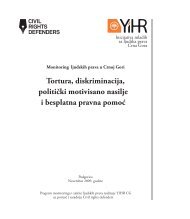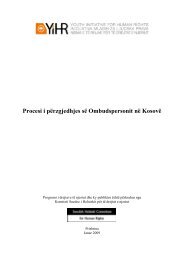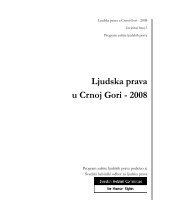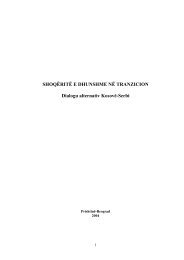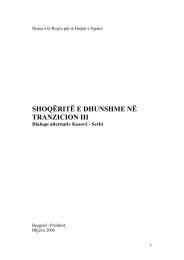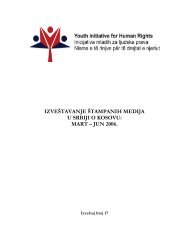Implementation of Transitional Laws in Serbia 2006
Implementation of Transitional Laws in Serbia 2006 - Archive
Implementation of Transitional Laws in Serbia 2006 - Archive
- No tags were found...
Create successful ePaper yourself
Turn your PDF publications into a flip-book with our unique Google optimized e-Paper software.
<strong>Implementation</strong> <strong>of</strong> <strong>Transitional</strong> <strong>Laws</strong> <strong>in</strong> <strong>Serbia</strong> <strong>2006</strong>have this type <strong>of</strong> autonomy. This raises the question <strong>of</strong> the basis on whichthe two prov<strong>in</strong>ces differ, and what the criteria are on the basis <strong>of</strong> which oneprov<strong>in</strong>ce does, and the other does not have essential autonomy.Issues which are <strong>of</strong> prov<strong>in</strong>cial significance are regulated by the law (whichthe Parliament <strong>of</strong> <strong>Serbia</strong> br<strong>in</strong>gs) 143 , while <strong>in</strong> the Article 183 it is stated thatthose issues can be <strong>in</strong> the field <strong>of</strong>:1. urban plann<strong>in</strong>g and development,2. agriculture, waterpower, forestry, hunt<strong>in</strong>g, fishery, tourism, cater<strong>in</strong>g, spas andsanatoriums, protection <strong>of</strong> environment, <strong>in</strong>dustry and craftsmanship, road, riverand railway traffic and road reconstruction, organiz<strong>in</strong>g fairs and other economicmanifestations,3. education, sports, culture, health and social protection and public <strong>in</strong>form<strong>in</strong>g on theprov<strong>in</strong>cial level 144 .Autonomous prov<strong>in</strong>ces regulate issues <strong>in</strong> these areas <strong>in</strong> accordance withthe law (which is passed by the Parliament <strong>of</strong> <strong>Serbia</strong>, because the Prov<strong>in</strong>cialParliaments are not allowed to pass laws) 145 . While autonomous prov<strong>in</strong>ceshave authentic <strong>in</strong>comes and are allowed to adm<strong>in</strong>ister their revenues, theymust be <strong>in</strong> ways that fully comply with the stipulations <strong>in</strong> the law. Thispractically means that Vojvod<strong>in</strong>a will possess its revenues and property(which will be determ<strong>in</strong>ed by the Parliament <strong>of</strong> <strong>Serbia</strong> through laws), but theParliament <strong>of</strong> <strong>Serbia</strong> will legally regulate how Vojvod<strong>in</strong>a should adm<strong>in</strong>isterits property. Such a formulation <strong>of</strong> prov<strong>in</strong>cial autonomy looks more like afoster<strong>in</strong>g relation <strong>of</strong> the Republic towards the Prov<strong>in</strong>ce, than like autonomy<strong>of</strong> a modern European region.The highest legal act <strong>of</strong> the Prov<strong>in</strong>ce, the Statute, is also passed with theprevious consent <strong>of</strong> the Republic Assembly 146 . This practically means thatby deny<strong>in</strong>g consent, the Parliament <strong>of</strong> <strong>Serbia</strong> can obstruct the process <strong>of</strong>adopt<strong>in</strong>g the Statute. There are no regulations <strong>in</strong> the Constitution whichwould prevent such behavior <strong>of</strong> the Republic Parliament.The Government <strong>of</strong> <strong>Serbia</strong> is allowed to challenge the constitutionality <strong>of</strong>143 Ibid, Article 177, Paragraph 2144 Ibid, Article 183, Paragraph 2145 Ibid146 Ibid, Article 18548



